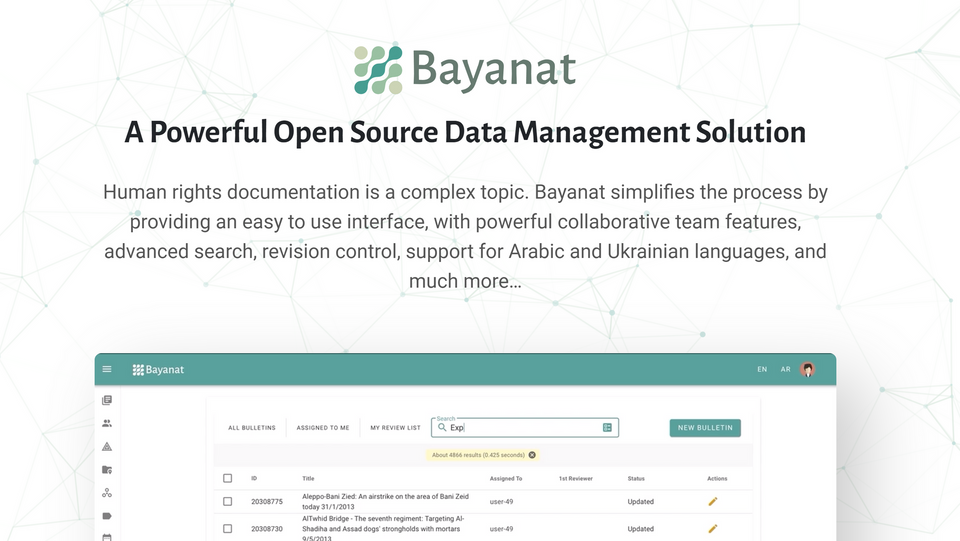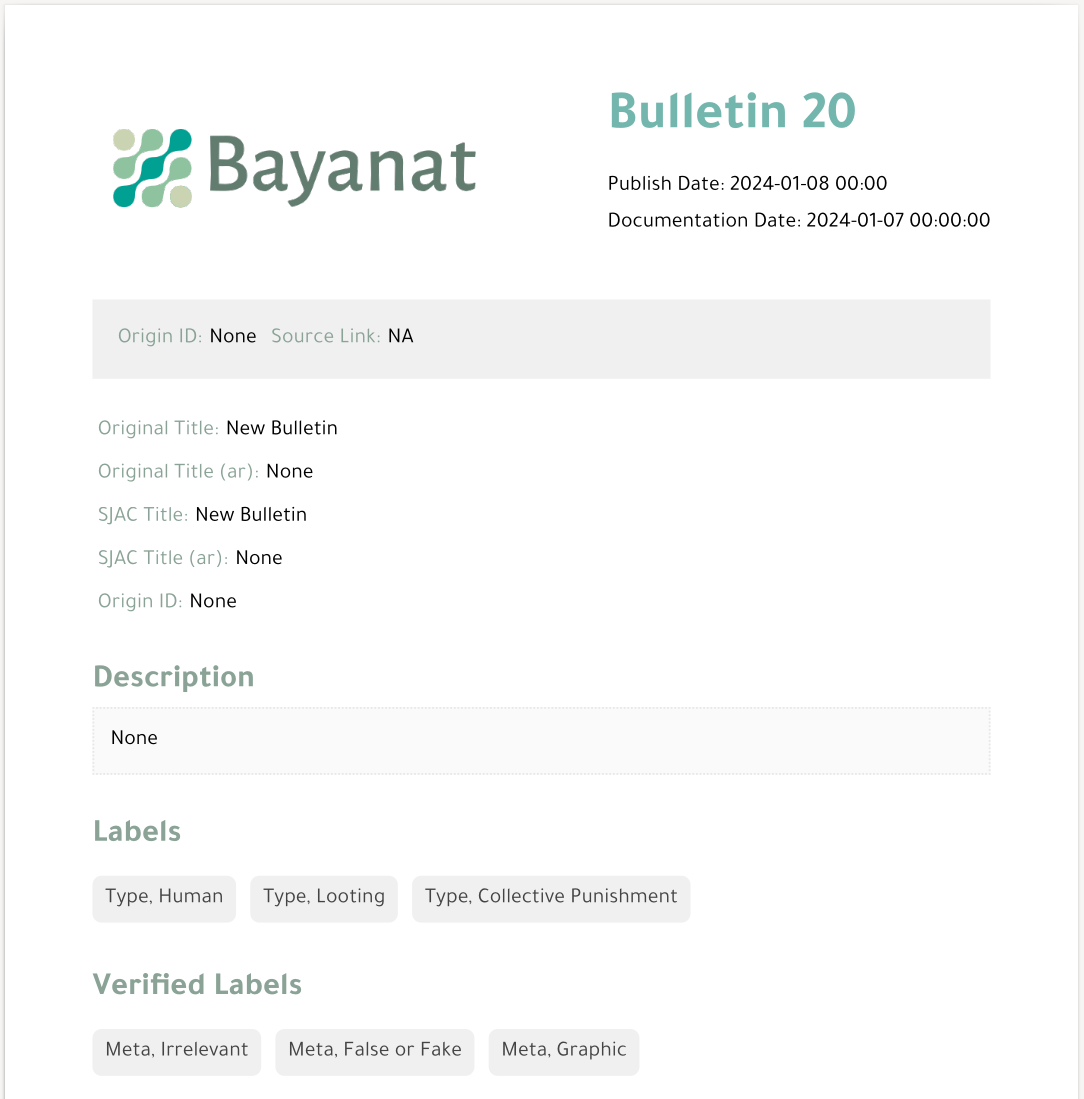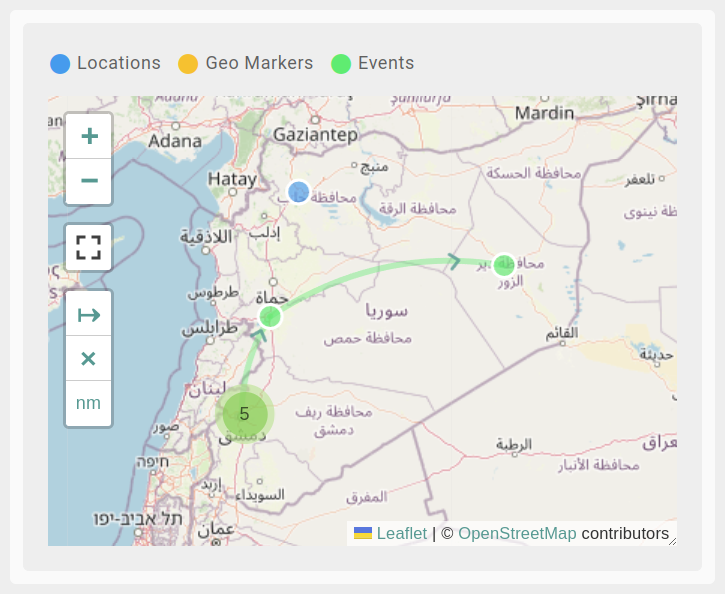
2023 Updates to SJAC’s Bayanat Database
In 2023, SJAC’s relational database Bayanat, underwent a series of transformative updates, improving security, efficiency, and user experience. This article looks at some of the most important changes to Bayanat and highlights how Bayanat is constantly being improved to help current and future users document, preserve, and analyze evidence of human rights abuses in conflicts around the world. As our user base grows we hope to continually upgrade Bayanat as a tool to document atrocities around the world.
To stay update-to-date with changes to Bayanat, follow their new blogsite here: https://blog.bayanat.org/
System Administration
Bayanat has introduced a new dynamic user interface dashboard, empowering administrators to manage application configurations and settings. This approach allows for seamless adjustments to the user experience without the need to modify the code directly, providing a more intuitive layout, and less reliance on IT personnel.
Bayanat also introduced a user interface that allows for the convenient editing of different data sets and configurations. The new dashboard, called Component Data, enables administrators to customize their Bayanat systems to any context or specific investigation they are researching. Data such as ethnographic information, names of administrative divisions, geo-location types and even relationship types between Actors, Bulletins and Incidents can be easily customized by administrators.
Increasing Security
In a bid to fortify Bayanat’s security infrastructure, we’ve introduced customizable security policies, allowing administrators to set and enforce security measures for users within the system. These policies include minimum password length and strength and enforcing two factor authentication. Administrators can also push individual or global password resets. For example, in case of suspicious activity, an administrator can invoke a systemwide or user specific reset of passwords, ensuring the system is secure until the user can reset their password.
Bayanat takes a significant step forward in authentication by implementing Webauthn which enables new authentication methods such as physical security keys and biometrics, for strengthened second-factor authentication. We’ve also introduced recovery keys for two factor authentication, allowing users to login to their accounts in case of a lost authenticator.
By implementing these new features, we provide an advanced security framework that perfectly balances robust protection with user-friendly accessibility.
Access Control
Administrators can now exercise fine-grained control over access to specific database items, empowering them to protect and segregate access to sensitive information. This feature allows administrators to assign items in the database to one or more groups of users. Bayanat’s data import tools has been tweaked to allow administrators to restrict access to items from the time they are imported.
Data Export Tool
The addition of Bayanat's Data Export Tool empowers authorized users, both staff and external organizations, to request exports of database items in various formats, such as PDF or CSV, as well as attached media files. Administrators can review and approve users’ requests before the user is able to download the requested files.

Import Improvement
Bayanat significantly upgraded its Media and Sheet Import tools. These enhancements include technical improvements to the backend code and the addition of an import log dashboard in the user interface. This dashboard allows administrators to easily monitor the status of import requests, track their progress, and identify any errors.
Search Improvements
Bayanat has added a new Geo-Spatial Search feature to its advanced search tools in the Actors, Bulletins, and Location dashboards. Users are now able to specify a geographical area to search by simply dropping a pin on a map and specifying the search radius. The database will then return any items that contain coordinates within the specified area.
The advanced search tools in Bayanat's Actors, Bulletins, and Incidents sections have seen numerous enhancements, including the ability to save searches, select specific date ranges, and search across more fields. These improvements collectively make it easier and more intuitive for users to locate any information within the database.
Event Map Visualization
A new map visualization displays and links events in Actors, Bulletins, and Incidents in chronological order, providing users with a dynamic and insightful timeline of events.

In summary, the 2023 updates to Bayanat reflect SJAC's commitment to enhancing security, efficiency, and user experience. These advancements demonstrate our dedication to evolving with our users' needs and the investigations they are conducting. We are grateful for the feedback we received from our partners that has shaped Bayanat and we look forward to continuing our joint efforts in documenting and analyzing human rights abuses.
As we reflect on Bayanat's journey in 2023, we're gearing up for an even more impactful year. Our focus is on fine-tuning the nuts and bolts—ensuring Bayanat is a reliable and secure tool for those championing human rights. We understand that reliability is crucial for those at the forefront of human rights work, and we will continually improve both the stability of Bayanat and the security measures safeguarding the sensitive data it houses.
We also want to ensure that our partners and our team can fully utilize the data they have collected. Therefore, we'll be working on introducing more features that aid open-source intelligence investigations and improve user experience.
For more information, or to request a demo of Bayanat, email SJAC at [email protected]
___________________________
For more information or to provide feedback, please contact SJAC at [email protected] and follow us on Facebook and Twitter. Subscribe to SJAC’s newsletter for updates on our work